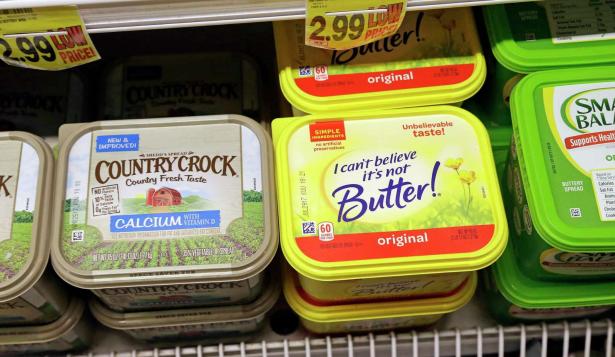food Court Dismissed I Can’t Believe It’s Not Butter Lawsuit Over Spray’s Calorie Content
I Can’t Believe It’s Not Butter! is how labels and ads read for a liquid product that’s been marketed since 1994. But a federal appeals court declared itself a believer Tuesday, and said the manufacturer can keep classifying it as a spray, not a butter or margarine — and telling consumers that each serving is free of calories and fats.
“The product comes in a spray bottle, with a finger-activated pump at the top,” said the Ninth U.S. Circuit Court of Appeals in San Francisco in a 2-1 ruling rejecting a consumer lawsuit. One tablespoon, the legally defined “serving” for butter or margarine, would require 40 sprays, the court said, and “common sense tells us that this is not how such a product is typically used.”
The class-action suit, initially filed in a Bay Area federal court in 2013, accused Unilever, then the manufacturer, of misrepresenting the amount of calories and fats in each serving and misleading customers into buying the product or paying too much for it. The liquid in each 12-ounce bottle, the suit said, contains 124 grams of fat and 1,160 calories, and a one-tablespoon serving would be neither calorie-free nor fat-free.
But the court said the standard serving for sprays is 0.25 grams, so the manufacturer is neither violating Food and Drug Administration rules nor deceiving consumers by advertising that the product has zero calories or fats per serving.
While consumers in the suit said the product was marketed as a substitute for butter, “under the FDA regulations, a ‘substitute’ food is not merely one that tastes the same (believably or not),” Judge Daniel Bress said in the majority opinion. Instead, he said, a “substitute food” is one that “may be used interchangeably with another food that it resembles.”
“Most any oil can fit in the ‘butter, margarine, oil, shortening’ category, but not every butter or oil-based product can be sprayed,” Bress wrote. The ruling upheld the dismissal of the suit in 2020 by U.S. District Judge Jeffrey White of Oakland.
Bress, appointed by President Donald Trump, was joined by another Trump appointee, Judge Lawrence VanDyke. The dissenting opinion came from an appointee of President Bill Clinton, Judge Carlos Lucero of the 10th U.S. Circuit Court of Appeals in Denver, temporarily assigned to the Ninth Circuit.
“The proposition that, absent some Canaan miracle, a bottle of flavored oil containing 1,160 calories and 124 grams of fat can be transformed into zero calories and zero grams of fat by the simple act of replacing the bottle cap with a pump device is ludicrous,” Lucero wrote. He said the court should let the case go to trial and allow a judge or jury to decide whether the product should be considered and regulated as butter.
That view was endorsed Tuesday by Uri Idstrom, a lawyer for the plaintiffs.
“Packaging the product in a pump-action squirt bottle does not miraculously transform it into a fat-free, calorie-free food,” Idstrom said. “Contrary to the majority opinion, we continue to believe that the FDA did not authorize Unilever to deceptively label its product 0-fat and 0-calories.” She said the plaintiffs were reviewing their options, which could include asking the full appeals court to order a new hearing before an 11-judge panel.
Reach Bob Egelko: begelko@sfchronicle.com; Twitter: @BobEgelko


Spread the word